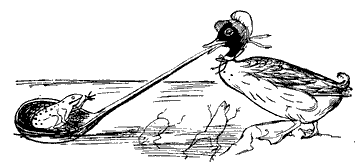Great minds, eh? Okay so I found this at the same time you did:
"Runcible " is a nonsense word invented by Edward Lear. The word appears (as an adjective) several times in his works, most famously as the "runcible spoon " used by the Owl and the Pussycat.[1] The word “runcible” was apparently one of Lear’s favourite inventions, appearing in several of his works in reference to a number of different objects. In his verse self-portrait, The Self-Portrait of the Laureate of Nonsense , it is noted that "he weareth a runcible hat ".[[2]]
(Runcible - Wikipedia) Other poems include mention of a "runcible cat ",[3] a "runcible goose " (in the sense of “silly person”),[4] and a "runcible wall "
Now I know that I still don’t know.
" (RUHN-suh-buhl) 
MEANING:
noun: A utensil that is a combination of a fork and spoon. Also known as a spork.
adjective: Shaped like a combination fork and spoon.
ETYMOLOGY:
Coined as a nonsense word by the poet Edward Lear (1812-1888) in 1871.
NOTES:
A runcible or spork is the love child of a spoon + fork, but that’s not what the word meant in the beginning. Edward Lear coined the word in the poem “The Owl and the Pussycat”:
They dined on mince, and slices of quince
Which they ate with a runcible spoon
What runcible meant was left to the imagination of the reader. Lear later used the same word to describe other things: cat, hat, goose, and wall. Eventually, the word took the sense of a spoon that can do the job of both a fork and a spoon.
If a spoon and a fork mate to give birth to a runcible or spork, what happens when other pieces of cutlery get together? Luis Giles has done the analysis.
USAGE:
“Hello, we said, to the beautiful dark starlit bar and the luxury therein: the runcible spoons with their slippery cargo: the snarled silk of tinned bean sprout, the wrinkled flame of the dried lily.”
Lynn Emanuel; The Dig and Hotel Fiesta; University of Illinois Press; 1994."
Thanks for the education!










 Runcible Award by
Runcible Award by 
